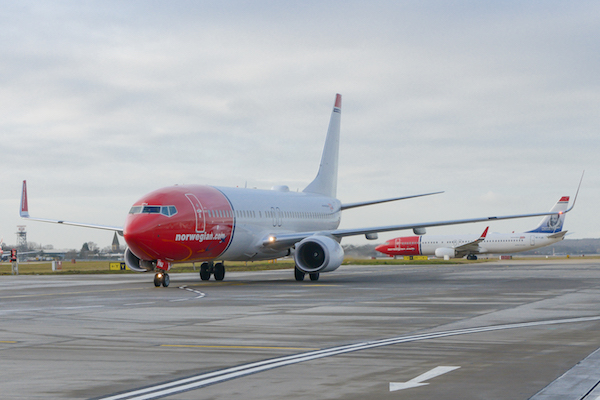Norwegian Air’s projected capacity growth for 2025 faces setbacks due to prolonged Boeing delivery delays. Strikes by machinists contribute to the challenges.
With its summer fleet expansion plans curtailed, Norwegian Air focuses on operational efficiency and strategic network enhancements to counteract these impediments.
Impact of Boeing Delays on Norwegian Air
Norwegian Air’s expansion plans for 2025 have been significantly hindered by delays in aircraft deliveries from Boeing. The Scandinavian airline, which owns both Norwegian Air and regional operator Wideroe, initially projected a 13% capacity increase. However, ongoing strikes involving over 30,000 Boeing machinists are expected to exacerbate the situation, creating further delays in aircraft availability.
The airline’s fleet was poised to expand to around 90 aircraft by the next summer season, which includes 22 Boeing 737 Max 8s. This growth has now been stalled, posing operational challenges. The delays threaten Norwegian Air’s strategic efforts to introduce new routes and enhance connectivity across Europe and beyond.
Strategic Response and Network Expansion
Chief Executive Geir Karlsen has emphasised a strategic approach to tackling these challenges. “Going forward we will continue to work on streamlining the operation and identify additional synergies with Wideroe,” he stated. This indicates a focus on operational efficiency and internal optimisations to mitigate external delays.
Norwegian Air remains committed to expanding its network despite the current hurdles. Plans to launch new routes to destinations such as Dubai, Egypt, and popular winter locations like Tromso and Evenes are still on the agenda. These routes are aimed at boosting the airline’s market presence and catering to both leisure and business travellers.
Financial Performance Amidst Operational Challenges
Despite the setbacks, Norwegian Air Group has reported a profitable summer quarter. With 8.2 million passengers transported between Norwegian Air and Wideroe, the airlines have successfully increased their load factors and unit revenues. This performance is particularly notable in light of a 10% capacity increase for Norwegian.
The acquisition of Wideroe has proven to be beneficial, contributing to a record quarter. The group’s ability to navigate these operational roadblocks while maintaining profitability highlights its resilience and the effectiveness of its strategic initiatives.
Norwegian Air’s efforts to solidify its position as a leading Nordic airline are evident. The company aims to maintain its operational momentum, ensuring that both its leisure and business travel segments remain robust.
Positioning in the Nordic Aviation Market
Norwegian Air is strategically positioned to address short-term fluctuations in demand, solidifying its place in the Nordic aviation sector. The group’s proactive measures are designed to adapt to market changes swiftly, ensuring competitive advantage and sustainability.
The collaboration between Norwegian Air and Wideroe is set to enhance operational efficiency and service delivery. Leadership has expressed confidence in leveraging this partnership to its full potential. This synergy is expected to enhance customer experience and operational fluidity.
Looking Ahead: Growth Projections and Challenges
As the airline looks to the future, the primary focus remains on mitigating challenges posed by the ongoing Boeing delays. Plans to expand the fleet and introduce more innovative routes are still intact, with careful adjustments to timelines and strategies to accommodate current constraints.
The airline anticipates a positive booking momentum into the fourth quarter, reflecting strong demand across its network. Efforts to maintain service excellence and customer satisfaction are central to its growth strategy, driven by a commitment to overcoming current impediments.
Norwegian Air’s approach includes reinforcing its market position through targeted expansion and strategic partnerships. This forward-thinking mindset is crucial to navigating the current aviation landscape, with a focus on long-term stability and growth.
Conclusion and Strategic Insights
In summary, Norwegian Air is navigating a complex landscape shaped by external challenges such as Boeing’s delivery delays. The group’s proactive strategies aim to mitigate these issues while pursuing growth and market expansion. Operational resilience and strategic foresight are at the core of Norwegian Air’s approach.
The airline’s focus on leveraging partnerships and enhancing its network reflects a robust commitment to overcoming obstacles and realising its vision for the future. As the situation evolves, Norwegian Air remains poised to adapt and thrive in the competitive aviation sector.
Norwegian Air is working diligently to overcome Boeing delivery delays impacting its 2025 expansion plans.
Through strategic initiatives and network optimisation, the airline aims to maintain a strong market position despite current challenges.

